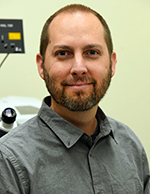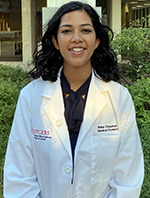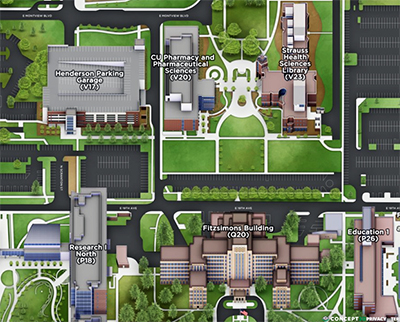Allyson Alexander M.D., Ph.D.
Principal Investigator | Assistant Professor
Allyson.Alexander@ChildrensColorado.org
 I
grew up in Annapolis, Maryland. I attended Stanford University, obtaining a combined B.S./M.S. in Biological science in 1999, with a minor in Computer Science. I then continued my training at the University of California, Irvine, then completed my
Ph.D. in the lab of Ivan Soltesz, Ph.D. in 2006, studying the role of hippocampal mossy cells in generating hyperexcitability after head trauma. After finishing my M.D. in 2008, I returned to Stanford for my Neurosurgery residency, which I completed
in 2015. During that time, I spent two years studying thalamocortical circuitry in epilepsy in the lab of John Huguenard. From 2015-16, I rejoined Dr. Soltesz’s lab (then at Stanford), and finally finished my long educational journey with a
fellowship in Pediatric Neurosurgery at Phoenix Children’s Hospital. I joined the faculty at CU Department of Neurosurgery/Children’s Hospital Colorado as an Assistant Professor in 2017. Currently, my lab is focused on uncovering the basic
neuronal, synaptic, and developmental
I
grew up in Annapolis, Maryland. I attended Stanford University, obtaining a combined B.S./M.S. in Biological science in 1999, with a minor in Computer Science. I then continued my training at the University of California, Irvine, then completed my
Ph.D. in the lab of Ivan Soltesz, Ph.D. in 2006, studying the role of hippocampal mossy cells in generating hyperexcitability after head trauma. After finishing my M.D. in 2008, I returned to Stanford for my Neurosurgery residency, which I completed
in 2015. During that time, I spent two years studying thalamocortical circuitry in epilepsy in the lab of John Huguenard. From 2015-16, I rejoined Dr. Soltesz’s lab (then at Stanford), and finally finished my long educational journey with a
fellowship in Pediatric Neurosurgery at Phoenix Children’s Hospital. I joined the faculty at CU Department of Neurosurgery/Children’s Hospital Colorado as an Assistant Professor in 2017. Currently, my lab is focused on uncovering the basic
neuronal, synaptic, and developmental
mechanisms that lead to seizures in malformations of cortical development (MCD).
Christine Brzezinski M.S.
Professional Research Assistant | Laboratory Manager
Christine.Brzezinski@CUAnschutz.edu
 I
am originally from Niagara Falls, NY. I graduated with a B.S. in Biology from SUNY Fredonia, and a M.S. in Human Genetics from the University of Michigan. After working in various labs in a few different states, I moved to Colorado in
2011 with my family and I’ve been in the Alexander Lab since 2017. I love living so close to the Rocky Mountains. Outside of lab, I enjoy hiking and skiing in the mountains, cooking, and traveling to new places.
I
am originally from Niagara Falls, NY. I graduated with a B.S. in Biology from SUNY Fredonia, and a M.S. in Human Genetics from the University of Michigan. After working in various labs in a few different states, I moved to Colorado in
2011 with my family and I’ve been in the Alexander Lab since 2017. I love living so close to the Rocky Mountains. Outside of lab, I enjoy hiking and skiing in the mountains, cooking, and traveling to new places.
John Keenan Kushner B.S. (Ph.D.)
PhD Candidate | Neuroscience Program
Keenan.Kushner@CUAnschutz.edu

I
study Fragile X Syndrome, which is currently the leading monogenic cause of autism spectrum disorder (ASD). This genetic neurodevelopmental disorder leads to many phenotypes including epilepsy, cognitive abnormalities, and sensory hypersensitivity. I
am currently studying how this genetic aberration plays a role in somatosensory circuit development, with specific focus on how the dysfunctional inhibitory GABAergic interneurons observed in FXS play a role in shaping these circuits and how this leads
to sensory processing deficits. In my free time, I like to play violin and piano, hang out at a local brewery with friends, go up to a mountain town for a quick hike or look around, and/or just have some good old-fashioned down time at home.
Paige Hoffman B.S. (Ph.D.)
Graduate Student | Neuroscience Program
Paige.Hoffman@CUAnschutz.edu

I
was born in Michigan and raised right outside of Boulder, CO. I graduated from the University of Colorado Boulder with a Bachelor’s in neuroscience before joining the Alexander lab as a research assistant. After a couple of years, I was accepted
as a direct-admit into the neuroscience graduate program on campus to pursue my thesis work with hub cells in a mouse model of malformation in cortical development (MCD). I also focus on the pathomechanisms of epileptogenesis in focal cortical dysplasia
(FCD) using both human tissue and a mouse model with constitutively active Rheb. My duties around the lab include immunohistochemistry, microscopy, human and mouse tissue collection, in-utero electroporations, and data analysis. When I’m not working,
I enjoy watching TV like Criminal Minds and Supernatural or finding new brunch spots with my friends.
Kelsey Patterson, M.D., Ph.D.
Pediatric Neurology Resident
Kelsey.patterson@childrenscolorado.org

I
grew up in Ohio and attended college at U.C. Berkeley and the University of Alabama at Birmingham, earning my B.S. in Neuroscience with a minor in Chemistry. I continued my training in the medical scientist training program at UAB, earning my Ph.D. in
the laboratory of Dr. Michelle Olsen in 2018 and my M.D. in 2020. Our research focused on characterizing a novel rat model of the developmental disorder Rett Syndrome, as well as evaluating the role of astrocyte potassium channels in modulating the development
of central chemosensitivity. I am currently completing a pediatric neurology residency at CU Anschutz/Children’s Hospital Colorado. My interests include epilepsy and brain injury and the ways in which these conditions interface with brain development
and neural circuit formation. My extended training has taught me the importance of savoring every moment of free time! In mine, you can catch me enjoying the solitude and beauty of the great outdoors with my partner and our dogs,
gardening, doing home
improvement projects, or sipping on a margarita.
Former Members
Serapio M. Baca Ph. D.Assistant Research Professor
Serapio.Baca@CUAnschutz.edu
I
am originally from Denver—grew up in Ft. Collins—and majored in Psychology at Colorado College. I spent my gap year at the National Institute of Mental Health at St. Elizabeths where I studied mechanisms underlying tardive dyskinesia. In Dr.
Kristan’s lab at UCSD, I completed my PhD in Neurosciences where I studied the role of inhibitory interneurons in a small neural network that controls movement. At UCLA, I completed a postdoctoral fellowship with Dr. Feldman where I studied the
neural control of respiration. I was then a Researcher in Dr. Charles’ Migraine Research Group where I used optogenetic approaches to study cortical spreading depression and its role in migraine. In Dr. Alexander’s lab, I perform combined
imaging and electrophysiological studies in both human and rodent tissue with the goal of understanding how epileptic activity arises from focal cortical dysplasia.

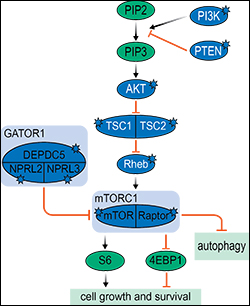 Childhood epilepsy is a common and often devastating disease, and chronic seizures lead to a significant increase in premature mortality and developmental delay. Children with epilepsy are at risk for other health problems including depression, anxiety,
learning disabilities, attention deficit hyperactivity disorder, and autistic spectrum disorder. Finally, children with uncontrolled seizures are at risk for premature mortality due to a condition known as sudden unexpected death caused by epilepsy
(SUDEP).
Childhood epilepsy is a common and often devastating disease, and chronic seizures lead to a significant increase in premature mortality and developmental delay. Children with epilepsy are at risk for other health problems including depression, anxiety,
learning disabilities, attention deficit hyperactivity disorder, and autistic spectrum disorder. Finally, children with uncontrolled seizures are at risk for premature mortality due to a condition known as sudden unexpected death caused by epilepsy
(SUDEP).
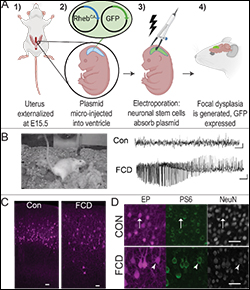 host of studies has implicated the mammalian target of rapamycin (mTOR) pathway as a key component in the pathogenesis of FCD. MTOR pathway upregulation has been linked to increased neuron size and neurite outgrowth, as well as changes
in synaptic inhibition. However, the precise mechanisms by which focal upregulation of mTOR leads to epileptogenesis in FCD are unknown. We aim to discover these mechanisms and thus develop new medical or surgical therapies to treat children with
this disease.
host of studies has implicated the mammalian target of rapamycin (mTOR) pathway as a key component in the pathogenesis of FCD. MTOR pathway upregulation has been linked to increased neuron size and neurite outgrowth, as well as changes
in synaptic inhibition. However, the precise mechanisms by which focal upregulation of mTOR leads to epileptogenesis in FCD are unknown. We aim to discover these mechanisms and thus develop new medical or surgical therapies to treat children with
this disease. 





